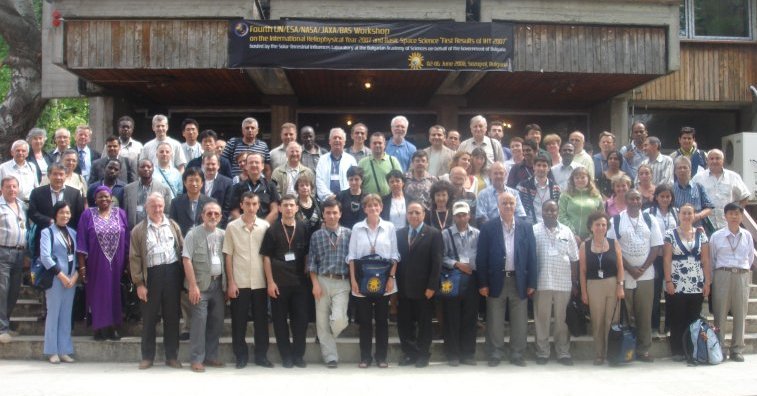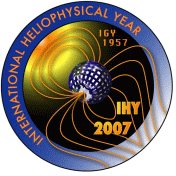UN/ESA/NASA/JAXA Workshop on
the International Heliophysical Year 2007 and Basic Space Science
"First Results from the International Heliophysical Year 2007"
hosted by the Solar-Terrestrial Influences Laboratory of the Bulgarian Academy of Sciences,
on behalf of the Government of Bulgaria
Workshop is over

| Pictures from this site 26 June, new 100 pictures added | Pictures from KASI South Korea |
|---|


|
|
Background of the Workshop
The United Nations, in cooperation with national and international space-related agencies and organizations, organized annually since 1990 workshops on basic space science, particularly for the benefit of scientists and engineers from developing nations. Drawing on nearly 15 years of workshops on basic space science, the United Nations Office for Outer Space Affairs, through the United Nations Basic Space Science Initiative (UNBSSI) will assist scientists and engineers from all over the world in participating in the International Heliophysical Year (IHY). At the 12th UN/ESA Workshop on Basic Space Science, held in P.R. China in 2004, it was recommended to focus future workshops on the preparations of IHY to be celebrated worldwide in 2007. Comprehensive information on IHY is available at Information on the International Heliophysical Year 2007 is available at official IHY WEB. More about Balkan, Black Sea and Caspian Sea Regional activities. (click here). Workshops on basic space science have been held in India (1991), Costa Rica and Colombia (1992), Nigeria (1993), Egypt (1994), Sri Lanka (1995), Germany (1996), Honduras (1997), Jordan (1999), France (2000), Mauritius (2001), Argentina (2002), China (2004). Since 2005, UNBSS has been organizing workshops on basic space science particularly focusing on the International Heliophysical Year 2007. The IHY-UNBSS workshop in Bulgaria (2008) will be the fourth one after United Arab Emirates (2005), India (2006), Japan (2007)..
Workshops on Basic Space Science contribute to the worldwide development of astronomy, particularly in developing nations. The Workshops have been held in the different regions on Earth.
| |
 What is UNBSS ? What is UNBSS ?
The United Nations Office for Outer Space Affairs, through the IHY secretariat and the United Nations Basic Space Science Initiative (UNBSSI) is assisting scientists and engineers from all over the world in participating in the International Heliophysical Year (IHY) 2007. A major thrust of the IHY/UNBSSI program is to deploy arrays of small, inexpensive instruments such as magneto meters, radio telescopes, GPS receivers, etc. around the world to provide global measurements of ionospheric and heliospheric phenomena. The small instrument program is a partnership between instrument providers, and instrument hosts in developing countries. The lead scientist will provide the instruments (or fabrication plans for instruments) in the array; the host country will provide manpower, facilities, and operational support to obtain data with the instrument typically at a local university. Existing data bases and relevant software tools can be identified to promote space science activities in developing countries. Extensive data on space science have been accumulated by a number of space missions. Similarly, long-term data bases are available from ground based observations. These data can be utilized in ways different from originally intended for understanding the Heliophysical processes. | |
 Goals of
|



